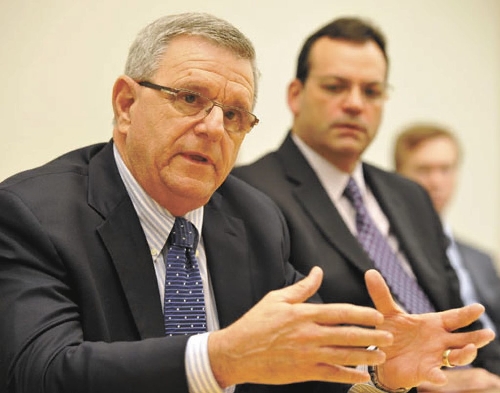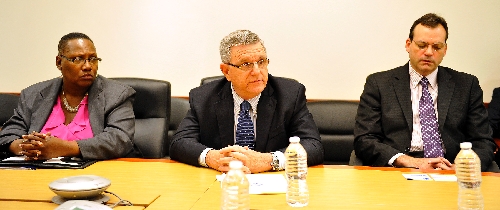Justice Department to reveal findings of Las Vegas police shooting investigation
The U.S. Department of Justice today will present the results of its seven-month investigation of the Las Vegas Metropolitan Police Department, with about 75 recommendations of ways the agency can reduce officer-involved shootings, improve accountability and provide better disclosure about the incidents.
The 150-page report, to be released at a 10:30 a.m. news conference, delves into issues ranging from methods used to hold officers accountable to ways the department trains them.
If implemented, the recommendations should make for a department that is safer for officers and for the public, said Bernard Melekian, director of the Justice Department's Office of Community Oriented Policing Services (COPS).
"We will save lives in the community of Las Vegas," Melekian told the Review-Journal in an exclusive interview Wednesday.
He praised Las Vegas police administrators for cooperating with investigators and said he expects the agency will adopt the recommendations. COPS will check on the department's progress within six months and issue a follow-up report in a year.
"It is our intention to ensure some sustainability," Melekian said. "This is not just a hit-and-run operation from the Justice Department."
Las Vegas police won't see the report until it is released this morning, but it has been reviewed by the Justice Department's Civil Rights Division, which retains the option of continuing the investigation or forcing reforms through a binding consent decree, Melekian said.
SHERIFF TAKES UP OFFER OF HELP
The Justice Department probe followed a yearlong Review-Journal investigation of officer-involved shootings in Southern Nevada published nearly a year ago.
While declining to detail the 75 recommended changes ahead of the report's release, Melekian said his investigators confirmed the Review-Journal's findings. The five-part series revealed a department unwilling to adopt best practices or hold officers accountable for use of force even in highly questionable cases.
Melekian said he called Clark County Sheriff Doug Gillespie to offer help in overhauling Nevada's largest police agency after reading the second day of the newspaper's series.
What was offered was a new Justice Department collaborative program aimed at reforming troubled police departments without resorting to the "hammer" of a longer and far more expensive civil rights investigation that could culminate in a consent decree.
Melekian, the assistant attorney general for the Civil Rights Division and U.S. Attorney General Eric Holder consider the approach the best way to achieve "the appropriate level of change desired" for the Las Vegas department.
Gillespie took him up on the offer, resulting in a "groundbreaking national model" that can be applied to police departments nationwide, Melekian said.
In previewing the report, Melekian said its findings echo the problems and solutions identified in the Review-Journal's series.
"It was very clear that the policies of the department and the investigative protocols were out of date," he said. "They were certainly not in keeping with best practices."
The 75 recommendations include many measures the department has already taken, such as:
■ Revising how and when the department uses military-grade assault rifles.
■ Emphasizing a culture of de-escalating confrontations with citizens.
■ Adding a statement that the department respects human life to its use of force policy.
That final change is among the most important, Melekian said.
"It makes a statement to the organization about what the organization's values are, and it also sets a threshold for evaluating officer actions," he said.
Evaluating the actions of officers after shootings is a weakness, and the study recommends restructuring the agency's Use of Force Review Board, a panel of civilians and officers who determine whether officers violated department policy, Melekian said.
The board cleared 99 percent of officers over a 10-year span, the Review-Journal found.
Melekian said none of the COPS recommendations will hamstring officers. Rather, he said, their adoption will improve the safety of officers and the public.
"Nothing that is in that report will jeopardize an officer working on the street," said Melekian, a former chief of police in Pasadena, Calif.
Implementing some of the recommendations may require additional funding, but most can be put in place by the department itself, he said.
Overall, the COPS team found many areas of concern within Las Vegas police, Melekian said, but the agency is "certainly not the worst" the team has seen.
COOPERATION FROM SHERIFF ON DOWN
More than 95 people, including current and former officers and Clark County District Attorney Steve Wolfson, were interviewed for the report, which involved work by CNA, a Virginia-based nonprofit research group hired by the Department of Justice. Investigators also had access to Las Vegas police records and procedures.
"We have had nothing but complete cooperation from the Las Vegas Metropolitan Police Department, from the sheriff all the way on down," Melekian said.
The Review-Journal gave investigators raw data used in its analysis of two decades of shootings involving hundreds of deaths. Melekian said spot-checks of that data confirmed the newspaper's determination that officers shoot at black subjects at a disproportionately high rate, among other findings.
The COPS report includes recommendations for addressing that imbalance, and its goal is to change the culture of the agency to reduce the number of shootings.
"The exercise of that power ought to be very rare," Melekian said.
The release of the study comes at a contentious time as challenges by police labor unions have effectively stymied efforts to add fairness and transparency to county coroner's inquests, which traditionally have been the only public airing of the facts of a shooting.
Meanwhile, the actions of Jesus Arevalo and other Las Vegas officers involved in the death of disabled Gulf War veteran Stanley Gibson are being scrutinized by a grand jury - the first such review in at least 20 years.
The COPS study does not focus on individual shootings, however. It looks at the incidents taken together, Melekian said.
Melekian will spend the rest of the week meeting with police and civil advocates, including the American Civil Liberties Union of Nevada and the Las Vegas Police Protective Association, the union that represents the department's rank-and-file cops.
The study adopted many of the recommendations of the ACLU of Nevada and the Las Vegas chapter of the NAACP, he said.
Melekian said he would be surprised if, in six months, the department hasn't adopted or isn't in the process of adopting all of the recommendations. But he said it isn't solely the Justice Department's responsibility to hold the department accountable.
"The determination of what they do really rests with them and the community," he said.
Contact reporter Lawrence Mower at lmower@reviewjournal.com or 702-405-9781. Contact reporter Brian Haynes at bhaynes@reviewjournal.com or 702-383-0281.
Deadly Force: When Las Vegas Police Shoot, and Kill
Las Vegas Review-Journal investigative series


















